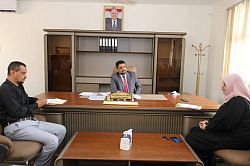
Minister of Technical Education Discusses Development of Vocational Education System with UNESCO Regional Center
Minister of Technical Education and Vocational Training Dr. Anwar al-Mahri met Tuesday with the National Coordinator of the UNESCO Regional Center for Quality and Excellence in Education Dr. Amjad Samir.

OCHA: Regional Escalation Directly Impacting Humanitarian Conditions in Gaza and the West Bank
United Nations Office for the Coordination of Humanitarian Affairs has warned that ongoing regional escalation is directly worsening the humanitarian situation in Gaza and the West Bank.

Korea large companies' exports rise 10 percent
Large companies' exports in South Korea rose approximately 10 percent year-on-year in the fourth quarter of last year, driven by increased global demand for semiconductors.

Saudi League: Al-Nassr, Al-Ettifaq and Neom Secure Victories Over Al-Ittihad, Damac and Al-Riyadh
Al-Nassr defeated its guest Al-Ittihad 2–0 in the match that brought them together at Al-Awwal Park Stadium in Riyadh, as part of the 21st round of the Saudi Professional League.
Last Update: ،
2026/03/04
Time
09:40:47
Latest News:
 SPRDY signs agreement to implement agricultural value chain project in 3 governorates
SPRDY signs agreement to implement agricultural value chain project in 3 governorates
 Minister of Agriculture Discusses with UNDP Interventions in Agricultural, Fisheries Sectors
Minister of Agriculture Discusses with UNDP Interventions in Agricultural, Fisheries Sectors
 Prime Minister urges escalating efforts to control crimes targeting public funds
Prime Minister urges escalating efforts to control crimes targeting public funds
 Minister of Culture, Tourism Discusses Support for Peace Efforts in Yemen with Berghof Foundation President ..
Minister of Culture, Tourism Discusses Support for Peace Efforts in Yemen with Berghof Foundation President ..
 Minister of Finance Discusses Enhancing Economic, Development Cooperation with French Ambassador
Minister of Finance Discusses Enhancing Economic, Development Cooperation with French Ambassador
Latest News:
 SPRDY signs agreement to implement agricultural value chain project in 3 governorates
SPRDY signs agreement to implement agricultural value chain project in 3 governorates
 Minister of Agriculture Discusses with UNDP Interventions in Agricultural, Fisheries Sectors
Minister of Agriculture Discusses with UNDP Interventions in Agricultural, Fisheries Sectors
 Prime Minister urges escalating efforts to control crimes targeting public funds
Prime Minister urges escalating efforts to control crimes targeting public funds
 Minister of Culture, Tourism Discusses Support for Peace Efforts in Yemen with Berghof Foundation President ..
Minister of Culture, Tourism Discusses Support for Peace Efforts in Yemen with Berghof Foundation President ..
 Minister of Finance Discusses Enhancing Economic, Development Cooperation with French Ambassador
Minister of Finance Discusses Enhancing Economic, Development Cooperation with French Ambassador
HRW: Houthi laid- mines kill civilians, banning aid
[23/04/2019 08:09]
BEIRUT-SABA
Human Rights Watch has said Houthi rebel militia widely use of landmines along Yemen's western coast since 2017 have killed and injured hundreds of Yemeni civilians and blocked the way before relief organizations to reach weak societies.
Although Yemeni law and Mine Ban Treaty 1997 prohibit using anti-persons mines, Houthi rebel militia used even anti-vehicles mines sporadically in a stark breach to war laws, which poses real threat on civilians after conflict.
“Houthi-laid landmines have not only killed and maimed numerous civilians, but they have prevented vulnerable Yemenis from harvesting crops and drawing clean water desperately needed for survival,” said PriyankaMotaparthy, acting emergencies director at Human Rights Watch. “Mines have also prevented aid groups from bringing food and health care to increasingly hungry and ill Yemeni civilians.”
Landmines laid in farmlands, villages, wells, and roads have killed at least 140 civilians, including 19 children, in the Hodeida and Taiz provinces since 2018, according to the Civilian Impact Monitoring Project, a humanitarian data source.
In a report issued by the organization on Monday, April 22, 2019, Human Rights Watch researchers visited the southern port city of Aden in February 2019 and interviewed civilians injured by landmines as well as civilians fleeing mined areas, aid workers, and a deminer from Yemen Executive Mine Action Centre; analyzed video and photographs collected in country; and reviewed Houthi state and military media channels.
HRW fond proves that in addition to anti-persons laid-landmines, Houthi militia laid anti-vehicles mines in civil areas, other anti-vehicles landmines modifiedto explode from a person weight and disguised improvised explosive devices as rocks or parts of tree trunks.
According to organization's report, landmines have also left at least three western coast water facilities inaccessible, two aid groups said.
"In addition, mines have made it more difficult for villagers to feed themselves and maintain their income. Five people said that they had been injured or that relatives had been killed when landmines detonated in farmlands or grazing lands; many displaced people said mines prevented safe harvesting and killed valuable livestock," the report went on.
Landmines have prevented humanitarian organizations from reaching communities in need along the western coast, Human Rights Watch said. These included villages and towns in the Tuhayta and Mawza’a districts, as well as the major port city of Hodeida.
Three aid groups said they could not reach key places or provide services to areas because landmines were planted there or along the route. Many of these communities are only accessible by dirt roads, which are far more hazardous than paved surfaces.
Key words:
PriyankaMotaparthy - ” Landmines - organization's - Landmines - organizations - “Houthi - According - organization - humanitarian - Although - Minister of Technical Education Discusses Development of Vocational Education System with UNESCO Regional Center
Minister of Technical Education Discusses Development of Vocational Education System with UNESCO Regional Center  SPRDY signs agreement to implement agricultural value chain project in 3 governorates
SPRDY signs agreement to implement agricultural value chain project in 3 governorates Minister of Agriculture Discusses with UNDP Interventions in Agricultural, Fisheries Sectors
Minister of Agriculture Discusses with UNDP Interventions in Agricultural, Fisheries Sectors Prime Minister urges escalating efforts to control crimes targeting public funds
Prime Minister urges escalating efforts to control crimes targeting public funds Minister of Culture, Tourism Discusses Support for Peace Efforts in Yemen with Berghof Foundation President
Minister of Culture, Tourism Discusses Support for Peace Efforts in Yemen with Berghof Foundation President  Minister of Finance Discusses Enhancing Economic, Development Cooperation with French Ambassador
Minister of Finance Discusses Enhancing Economic, Development Cooperation with French Ambassador  Minister of Local Administration, UNDP Discuss Support for Decentralization
Minister of Local Administration, UNDP Discuss Support for Decentralization  Foreign Ministry Denounces Iran’s Attack on U.S. Embassy in Riyadh
Foreign Ministry Denounces Iran’s Attack on U.S. Embassy in Riyadh Ambassador Al-Sunaini, Japanese Lawmaker Discuss Boosting Parliamentary Cooperation
Ambassador Al-Sunaini, Japanese Lawmaker Discuss Boosting Parliamentary Cooperation Ambassador Al-Sunaini Meets Special Advisor to Japanese PM
Ambassador Al-Sunaini Meets Special Advisor to Japanese PM


